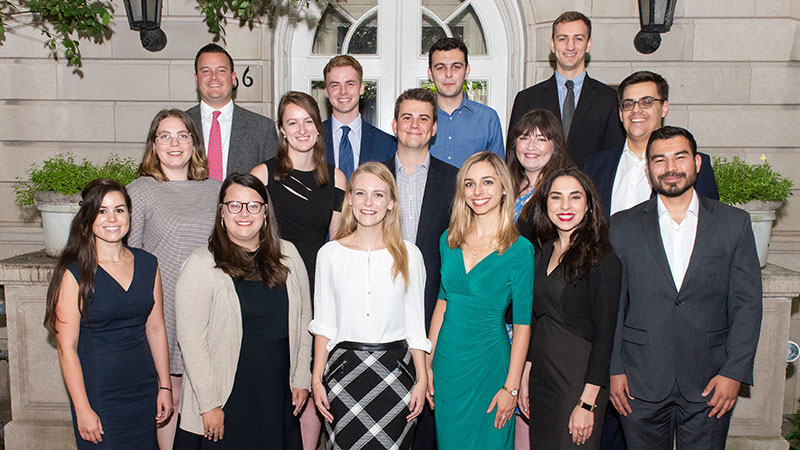
After nine months of academic meetings and retreats examining the fundamentals of republican government, 18 young professionals complete their time as the 2018-19 TFAS Public Policy Fellows on May 14.
I was able to meet a group of people with different backgrounds but equal passion to make the world a better, freer place.” – Melanie Benit, Institute for Justice
The 2018-19 Fellowship began last fall with a retreat in Gettysburg on the Lincoln-Douglas debates led by Dr. Colleen Sheehan of Villanova University and Dr. Allen Guelzo of Gettysburg College. Monthly discussions also featured exciting speakers and topics including Matt Spalding of the Hillsdale College Kirby Center on “Statesmanship and Political Wisdom;” Josh Mitchell of Georgetown University on “Citizens in the Democratic Age;” and Matt Continetti, Novak ’08, of the Washington Free Beacon on “Willmoore Kendall, the Conservative Movement and Free Speech.”
See our 2018-19 monthly highlights below to gain a glimpse inside the TFAS Public Policy Fellowship. To learn more about the Fellowship and to apply for the 2019-20 program, visit TFAS.org/PPF.
Monthly Highlights
September: Welcome Reception
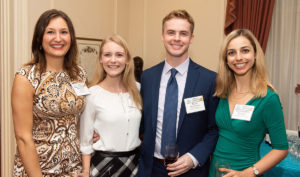
TFAS welcomed the 2018-19 cohort of 18 young professionals at a TFAS Public Policy Fellowship welcome reception on Sept. 12, 2018. The gathering connected this year’s class with more than 45 past Fellows, staff and alumni.
Brenda Hafera, TFAS director of international programs and continuing education, said the program would allow Fellows to not only learn from guest speakers, academics and journalists, but from each other as well.
“Deliberation and debate are the basis of a free society and the means of educating ourselves,” Hafera said. “Engaging with others in a generous manner also gives our fellow citizens the opportunity to refine their own views.”
October: Fall Retreat in Gettysburg
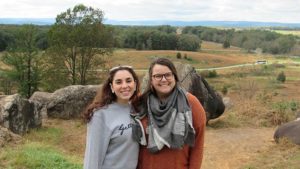
TFAS Public Policy Fellows searched for insights into today’s political dilemmas by examining one of the most contentious times in America’s history – the Civil War – during a weekend retreat last fall.
Michael Finch, PPF ’18, said the weekend provided a stimulating symposium for discussion. “We engaged in open discussions about the enduring legacy of debate, its importance to self-government and the difficulty of balancing principles with practical government in the modern age.”
November: Citizens in the Democratic Age with Tocqueville Scholar
Renowned Georgetown professor of political theory, Dr. Josh Mitchell, led the cohort in a discussion on rational self interest and social order. Mitchell, a dedicated TFAS professor and Tocqueville scholar, brought his expertise on the French diplomat’s perspective on the character of U.S. citizens.
Mitchell challenged the Fellows to consider how the breakdown of local institutions and a lack of participation in local government has impacted the American character and spirit. He noted that millennials, in particular, prefer to have virtual interactions – shopping online, interacting on social media and using online dating apps – as opposed to in person interactions. Fellows then discussed how these choices and trends have influenced the current generation of young adults.
December: Foreign Policy Discussion with Marine Corps University Professor
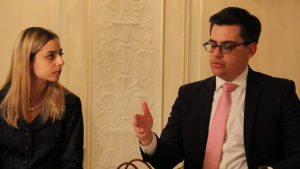
Nearing the end of 2018, the Fellows were treated to a special discussion on international relations with Marine Corps University Professor Dr. Chris Harmon.
Harmon detailed opportunities for the Fellows to work in foreign policy including civil military relations, public diplomacy, immigration and financial reform and provided an overview of world events that determine U.S. foreign policy today.
Frederico Bartels, PPF ’18, a policy analyst for defense budgeting in the Heritage Foundation’s Center for National Defense, said Harmon was a thoughtful speaker who was able to walk the Fellows through the issues and elements that shape U.S. foreign policy.
Harmon brought a “more holistic” perspective, as “he was able to tie together the different instruments that are available to craft foreign policy, in and out of government,” Bartels said.
January: Statesmanship and Prudence
The second half of the Fellowship year kicked off with a lesson on statesmanship led by Matt Spalding, the associate vice president and dean of educational programs for Hillsdale College in Washington, D.C.
Spalding explained that prudence is the virtue that guides a statesman to navigate sometimes difficult political realities while still moving toward a greater realization of abstract truths.
Spalding revealed that this teaching can be traced back to the writings of Aristotle and how it was employed by great leaders including Washington, Lincoln and Churchill.
February: Winter Retreat on Religion and Free Markets
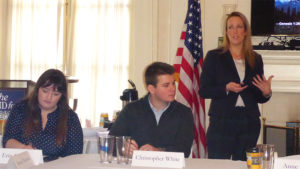
The Fellows spent a day discussing whether or not there is a tension between religion and free-market economics during the TFAS Public Policy Fellows winter retreat on February 2.
TFAS Academic Director Dr. Anne Bradley and Dr. Rusty Reno, editor of First Things magazine, each delivered an argument for their respective sides. Fellows were then given the opportunity to examine the question themselves and engaged in a Socratic-style seminar guided by the discussion leaders and pre-assigned readings focused on human flourishing and labor capital.
They discussed both overarching principles, such as the free market’s ability to combat poverty, as well as practical political questions, such as U.S. trade policy.
March: Free Speech and The Media
TFAS Novak Fellow Matthew Continetti, Novak ’08, met with TFAS Public Policy Fellows at TFAS Headquarters on March 12 to discuss how attitudes toward free speech have shifted throughout American history, using the arguments of Willmoore Kendall to frame the conversation.
The discussion allowed the Fellows to hear about issues surrounding freedom of speech from a seasoned journalist and professional.
April: Religious Freedom and the Constitution
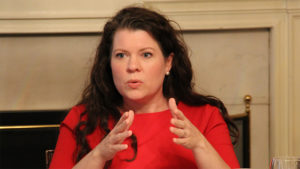
For the final academic discussion of the 2018-19 Fellowship, TFAS alumna and senior counsel at the Becket Fund for Religious Liberty, Lori Windham ’00, discussed the relationship between the Constitution and religious freedom at TFAS Headquarters on April 9.
The discussion ultimately led the Fellows to consider why religious liberty was considered to be so fundamental that it was listed as a first freedom in the Bill of Rights.
TFAS Public Policy Fellow Melanie Benit ’14, ’15, PPF ’18, who works with the civil liberties law firm the Institute for Justice, found this to be an intriguing question.
“I had not given thought to why freedom of religion is listed first, and Lori Windham’s lecture shed new light for me in understanding how our forefathers thought about religious liberty,” she said. “It’s listed first not by accident but because religious liberty is at the core of human consciousness.”
TFAS is currently accepting applications for its 2019-20 cohort of the TFAS Public Policy Fellowship. To learn more and apply, please visit TFAS.org/PPF.

